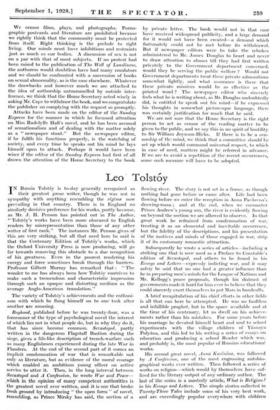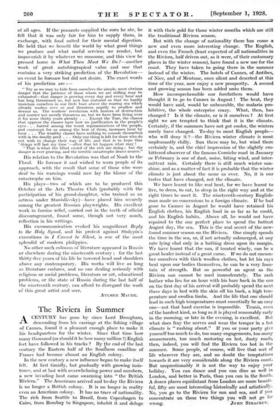Leo • Tolst6y I N Russia Tolst6y is to-day generally recognized
as their greatest prose writer, though he was not in sympathy with anything resembling the regime now prevailing in that country. There is in England no similarly decisive preference for his works, partly because, as Mr. J. H. Penson has pointed out in The Author, " Tolst6y's works have been more obscured to English readers by misrepresentation than those of any other writer of first rank." The instances Mr. Penson gives of this are very striking, but all that need here be said is that the Centenary Edition of TolstUy's works, which the Oxford University Press is now producing, will go far towards removing this obstacle to a due recognition of his greatness. Even in the poorest rendering his energy and force sometimes break through the barriers. Professor Gilbert Murray has remarked that : " The wonder to me has always been how Tolst6y contrives to make such a tremendous and characteristic impression through such an opaque and distorting medium as the average Anglo-American translation."
The variety of TolstOy's achievements and the enthusi- asm with which he flung himself on to one task after another are amazing.
Boyhood, published before he was twenty-four, was a forerunner of the type of psychological novel the interest of which lies not in what people do, but in why they do it, that has since become common. Sevastopol, partly written in the dangerous Flagstaff Bastion during the siege, gives a life-like description of trench-warfare such as many Englishmen experienced during the late War in Flanders. At the end of the second part of it comes an implicit condemnation of war that is remarkable not only as literature, but as evidence of the moral courage which enabled an ambitious young officer on active service to utter it. Then, in the long interval between Sevastopol and A Confession, he wrote War and Peace- yhich in the opinion of many competent authorities is the greatest novel ever written, and it is one that broke fresh ground by introducing " the open form " of novel, resembling; as Prince Mirsky has said, the section of a flowing river. The story is not set in a frame, as though nothing had gone before or came after. Life had been flowing before we enter the reception in Anna Pavlovna's drawing-room ; and at the end, when we encounter Prince Andrew's young son, the river is evidently flowing 'on beyond the section we are allowed to observe. In that great work he refrained from condemnation of war, treating it as an elemental and inevitable occurrence, but the fidelity of the descriptions, and his presentation of the motives and minds of those engaged in war, strip it of its customary romantic attraction.
Subsequently he wrote a series of articles—including a striking one that is now used as a Preface to Constable's edition of Sevastopol, and others to be found in his Essays and Letters—expressly indicting war, and it may safely be said that no one had a greater influence than he in preparing men's minds for the League of Nations and Mr. Kellogg's peace proposals, though his distrust of governments made it hard for him ever to believe that they could sincerely exert themselves to put Mars in handcuffs.
A brief recapitulation of his chief efforts in other fields is all that can here be attempted. He was no faultless and infallible prophet, but in the space available and at the time of his centenary, let us dwell on his achieve- ments rather than his mistakes. For some years before his marriage he devoted himself heart and soul to school experiments with the village children of Yasnaya Polyana, and this led to his writing a series of essays on education and producing a school Reader which was, and probably is, the most popular of Russian educational works.
His second great novel, Anna Karaina, was followed by A Confession, one of the most engrossing autobio- graphical works ever written. Then followed a series of works on religion—which would by theinselves have suf- ficed for the literary output of any ordinary author. The last of the series is a masterly article, What is Religion? in his Essays and Letters. The simple stories collected in Twenty-Three Tales include some of his very best work, and are exceedingly popular everywhere with children of all ages. If the peasants supplied the corn he ate, he felt that it was only fair for him to supply them, in exchange, with food suited for their mental digestion. He held that we benefit the world by what good things we produce and what useful services we render, but impoverish it by whatever we consume, and this view he pressed home in What Then Must We Do ?—another work of great autobiograpical value and one that contains a very striking prediction of the Revolution— an event he foresaw but did not desire. The exact words of his prediction are :- " Try as we may to hide from ourselves the simple, most obvious danger that the patience of those whom we are stifling may be exhausted—that danger is growing every day and every hour and has long threatened us, but now has matured so that we hardly maintain ourselves in our little boat above the roaring sea which already washes over us and threatens angrily to swallow and devour us. The workers' revolution with horrors of destruction and murder not merely threatens us, but we have been living over it for some thirty years already . . . Except the Tsar, the classes that oppress the masses have now no justification in the people's eyes . . . hatred among the worst representatives of the people, and contempt for us among the best of them, increases hour by hour . . . The wealthy classes have nothing to console themselves with in the deadly peril . . . Only one thing is left for those who do not wish to change their way of life, and that is to hope that ' things will last my time '—after that let happen what may !
" That is what the blind crowd of the rich are doing ; but the danger is ever growing, and the terrible catastrophe draws nearer."
His relation to the Revolution was that of Noah to the Flood. He foresaw it and wished to warn people of its approach, with the result that some of those who were deaf to his warnings would now lay the blame of the catastrophe on him.
His plays—two of which are to be produced this October at the Arts Theatre Club (probably with the ' participation of his grand-daughter, who trained as an actress under Stanislaysky)—have placed him securely among the greatest Russian playwrights. His excellent work in famine relief, carried out in the 'teeth of official discouragement, found some, though not very much, reflection in his writings.
His excommunication evoked his magnificent Reply to the Holy Synod, and his protest against Stolypin's executions in I Cannot be Silent, is one of the most splendid of modern philippics.
No other such colossus of literature appeared in Russia or elsewhere during the nineteenth century ; for the last thirty-five years of his life he towered head and shoulders above any contemporary. His works will live as long as literature endures, and no one dealing seriously with religious or social problems, literature or art, educational problems, or the state of Russia during the last half of the nineteenth century, can afford to disregard the work of this great artist and seer.
AYLMER MAUDE.































 Previous page
Previous page